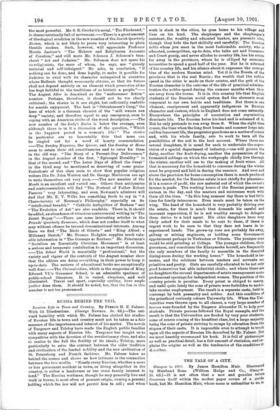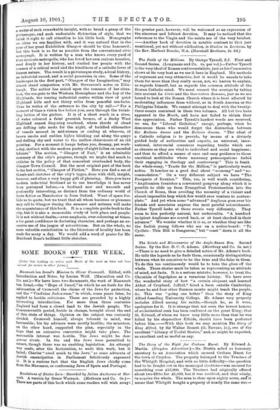THE TALE OF A CITY.
Glasgow in 1901. By James Hamilton Muir. Illustrated by Muirhead Bone. (William Hodge and Co., Glasgow- 2s. 6d.)—It is not often that a new and genuine talent discovers itself within the modest paper covers of a guide book, but Mr. Hamilton Muir, whose name is unfamiliar to us, is a writer of such remarkable insight, with so broad a grasp of the picturesque, and such undeniable distinction of style, that we think it right to call attention to his little book. Monographs on cities we are, fasniliar..with, and it was natural that in the year of her great Exhibition Glasgow should be thus honoured ; but this book is as far as possible from the conventional civic monograph. It is written by a man who knows every yard of that intricate metropolis, who has loved her own curious beauties, read deeply in her history, and studied her people with the acumen of a critical mind and the kindliness of a catholic lover of human nature. The result is apicturesque study, a local history, an industrial record, and a social panorama in one. Some of the landscapes in the first part, " Glasgow of the Imagination," may almost stand comparison with Mr. Stevenson's notes on Edin- burgh. The author has seized upon the romance of her situa- tion, the sea-gate to the Western Hemisphere and the key of the Highlands, the roaring industrial centre within view of quiet Highland hills and not thirty miles from peaceful sea-lochs. Thus he writes of the entrance to the city by rail:—" For a moment of time a vision lies before you, seen through the twink- ling lattice of the girders. It is of a short reach in a river, of water coloured a faint greenish bronze, of a dusky West Highland sunset lingering overhead, where shreds of cloud are drifting into nests for the night, of huddled silhouettes of vessels moored in mid-stream or coaling at wharves, of brown smoke and sudden lights blinking out along the quays and dulling sky and water• to the mellow chiaroscuro of an old painting. For a moment it hangs before you, dreamy, yet work- aday, instinct with the modern poetry of night fallen on unended labours." The section, " Glasgow of Fact," is an admirable summary of the city's progress, though we might find much to criticise in the policy of that somewhat overloaded body, the Glasgow Town Council. But the most original part of the book is the last section, " Glasgow of Fiction." Here you find a set of thumb-nail sketches of the city's types, done with skill, insight, humour, and often a very happy gift of phrasing. Here you have modern industrial Scotland as to our knowledge it has never been portrayed before,—a Scotland new and uncouth and profoundly interesting, as distinct from the ordinary world of Scots fiction as Manchester is from Oxford. Want of space for- bids us to quote, but we trust that all whom business or pleasure may call to Glasgow during the summer and autumn will make the acquaintance of this book. It is a complete guide-book to the city, but it is also a memorable study of both place and people. It is not without faults,—over-emphasis, over-colouring at times, a too great confidence in docketing eharacter, and perhaps an ex- cessive use of the jargon of art-criticism. But on the whole, no more valuable contribution to the literature of locality has been made for many a day. We would add a word of praise for Mr. Muirhead Bone's brilliant little sketches.



































 Previous page
Previous page